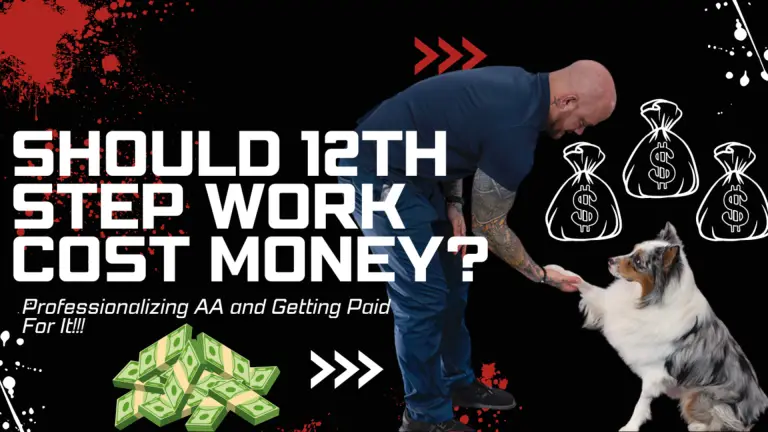The 8th Tradition AA ensures that Alcoholics Anonymous should remain forever nonprofessional, keeping the focus on one alcoholic helping another without financial motives. While AA does employ special workers for administrative roles, 12-step work is always freely given.
This distinction protects the group purpose, ensuring that sponsorship and carrying the message remain acts of service, not paid professions. By maintaining this balance, special workers support AA’s operations without compromising the fellowship’s core mission of recovery through spiritual principles.
What Is the 8th Tradition of Alcoholics Anonymous?
Tradition 8 AA States:
“Alcoholics Anonymous should remain forever nonprofessional, but our service centers may employ special workers.”
The Meaning of “AA Should Remain Forever Nonprofessional”
Tradition 8 of AA ensures that Alcoholics Anonymous remains a fellowship, not a business or professional service. Recovery is built on one alcoholic helping another, free of charge, preserving the spiritual foundation of the Twelve Steps. Unlike treatment programs or therapy, AA does not charge for sponsorship, step guidance, or meetings. The idea is simple: recovery is freely given, just as it was freely received.
To remain forever nonprofessional, AA avoids paid positions related to 12-step work. If sponsorship or guidance through the steps became a profession, it would lose its sincerity. The message could become distorted, and financial motives might take precedence over genuine service. Keeping AA nonprofessional ensures that alcoholics seeking help never feel pressured to pay for recovery, reinforcing the group purpose of carrying the message without expectation of personal gain.
The Role of Service Centers that Employ Special Workers in AA
While step work is always unpaid, service centers may employ special workers for essential administrative roles. These workers manage AA’s literature distribution, event coordination, and office operations, ensuring the fellowship remains functional.
However, these special workers are not counselors or therapists—they support service centers, not 12-step recovery itself. Their roles are necessary to maintain AA’s accessibility while keeping the program’s foundation untouched by professional influence. This balance allows Alcoholics Anonymous to stay effective, ensuring that those seeking help can always find it—freely, without financial barriers.
Why AA Refuses to Pay for 12-Step Work

The Difference Between Paid Service Positions and Carrying the Message for Free
The Twelve Traditions make it clear that AA is a spiritual program, not a professional service. To protect its primary purpose, the fellowship strictly separates 12th Step work from any form of paid labor. While service centers may employ individuals for administrative tasks, AA does not compensate anyone for sponsorship, step guidance, or leading meetings. This ensures that recovery remains an act of service, free from financial motivation.
AA does employ alcoholics for such special services as literature distribution, organizing events, and handling operations at the General Service Office. These paid workers fulfill necessary functions that keep AA running but are never involved in direct counseling alcoholics or step work. This distinction is critical to maintaining the integrity of the program.
To define professionalism in AA, the 8th Tradition explains that helping fellow alcoholics should never become a paid profession. If sponsorship were a job, the sincerity of carrying the message could be compromised. By ensuring that special workers focus solely on administrative tasks while keeping 12-step work free, AA safeguards the spiritual foundation of recovery. The message is clear: AA must remain forever nonprofessional to keep its solution available to anyone seeking help.
The Consequences of Ignoring the 8th Tradition

How Professionalism Can Distort the AA Message
The 8th Tradition was established to protect the fellowship from becoming a business, yet when individuals attempt to profit from personal AA efforts, the integrity of the program is threatened. Sponsorship or step work is not a commodity—it is an act of service. When AA members charge for guidance, they risk misleading newcomers into believing that recovery must be purchased, rather than received freely. This contradicts the spiritual principles AA was built upon.
If professionalism seeps into AA, it could shift the fellowship’s focus away from service and toward financial gain. Without adherence to the group conscience, some might attempt to create serviceboards that introduce hierarchy, weakening the structure of Alcoholics Anonymous groups where all members are equals. The concept of one ultimate authority, a Higher Power guiding the fellowship, is replaced by individual control, diluting the message.
AA thrives on rotating leadership, ensuring no one gains undue influence. When step work becomes a profession, it can hinder spiritual growth, as financial motives interfere with selfless service. By keeping recovery separate from any outside enterprise, AA remains a space where alcoholics freely help one another, reinforcing the reality that personal recovery depends on giving back, not profiting.
How to Honor The Eighth Tradition in Your Own Recovery

Keeping the Spiritual Foundation of Service Alive
The Eighth Tradition reminds us that recovery is a gift meant to be shared without expectation of compensation. One alcoholic helping another is at the heart of AA, ensuring that sponsorship remains an act of service rather than a profession. Blurring the line between sponsorship and paid work can compromise the common welfare, shifting the focus from spiritual growth to financial interests.
AA has always been clear: the occupation of counseling alcoholics for fees does not belong in the fellowship. While treatment centers and therapy provide valuable resources, they are a related facility, separate from AA itself. Those who sponsor and carry the message must do so without financial motive, keeping the solution accessible to anyone who is ready to stop drinking.
To protect the program’s integrity, AA avoids outside contributions, preventing financial influence from shaping the fellowship’s direction. Trusted servants are there to facilitate the message, not to profit from it. By upholding Tradition Eight, members ensure that AA remains a non-professional fellowship where the only requirement is a desire to recover. This safeguards the Twelve Steps as a freely available path to sobriety, avoiding public controversy and keeping AA’s purpose pure.
FAQ – Common Questions About the 8th Tradition
What is the long form of Tradition Eight in Alcoholics Anonymous?
“Alcoholics Anonymous should remain forever nonprofessional. We define professionalism as the occupation of counseling alcoholics for fees or hire. But we may employ alcoholics where they are going to perform those services for which we might otherwise have to engage nonalcoholics. Such special services may be well recompensed. But our usual A.A. Twelfth Step work is never to be paid for.”
What are some examples of paid positions in AA?
While Alcoholics Anonymous should remain forever nonprofessional, certain roles within service centers and the General Service Board require paid staff. These include literature distribution, administrative support, and maintaining AA’s infrastructure. These special services help the fellowship function but do not involve step work or sponsorship. Committees directly responsible ensure that paid roles align with AA’s traditions.
Can AA meetings be held inside treatment centers?
Yes, but the distinction between AA and other groups must be maintained. Meetings should be led by AA group members, not staff members, to prevent conflicts of interest. AA does not provide medical or therapeutic services, so meetings must focus solely on the Twelve Traditions and AA’s spiritual solution rather than professional treatment approaches.
Why does AA not pay sponsors?
Paying sponsors would prestige divert AA’s core mission, shifting recovery from an act of service to a financial transaction. AA is fully self-supporting and sponsorship is a gift, not a job. Introducing money into Twelfth Step work would create matters affecting AA’s integrity and compromise the selfless nature of carrying the message. Maintaining personal anonymity keeps the focus on helping others rather than financial gain.
Adam Vibe Gunton is an American author, speaker and thought leader in addiction treatment and recovery. After overcoming homelessness and drug addiction, Adam found his life’s purpose in helping addicts find the same freedom he found. As Founder and Executive Director of the 501(c)3 nonprofit, Recovered On Purpose, and Managing Partner of Behavioral Health Partners, Adam has helped thousands find freedom from addiction all over the world.
